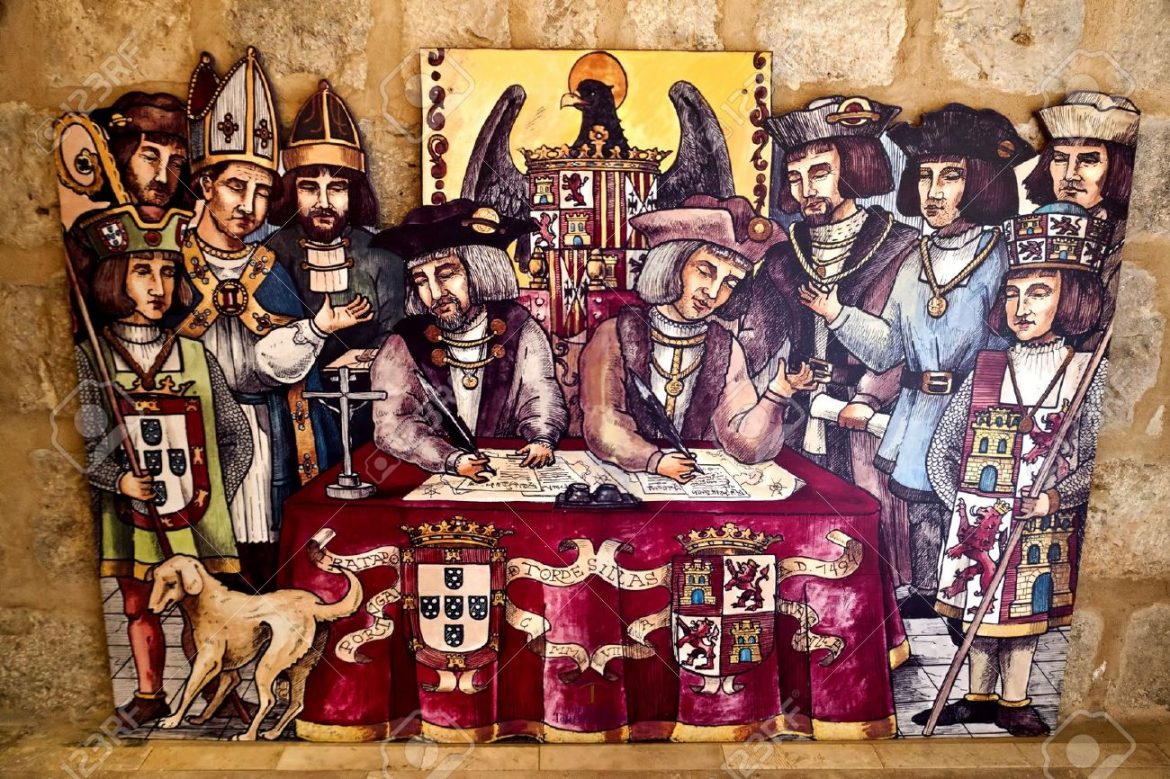In the late 15th century, the Age of Exploration was in full swing. European powers, eager to expand their influence and wealth, raced to claim new territories across the globe. Among them, Spain and Portugal emerged as dominant players, their ambitions fueled by the promise of untold riches and undiscovered lands. But as their paths converged in the uncharted seas, tensions began to rise. In an effort to maintain peace and avoid open conflict, the two empires turned to diplomacy, resulting in one of history’s most transformative political decisions: the Treaty of Tordesillas. Though largely forgotten by many today, this treaty not only redefined geopolitical boundaries but also shaped the cultural and political landscapes of the modern world.
By 1492, Christopher Columbus’s journey to the Americas had reignited Spain’s fervor for exploration. However, Portugal, with its established dominance in maritime trade routes to Africa and Asia, had its own aspirations. The two kingdoms, both Catholic, sought the Pope’s guidance to resolve their territorial disputes. In 1493, Pope Alexander VI issued a decree establishing a demarcation line roughly 100 leagues west of the Cape Verde Islands. All lands to the west of this line were to be claimed by Spain, and those to the east by Portugal. While this papal bull momentarily appeased both parties, it lacked precision and failed to account for future discoveries.
Recognizing the need for a clearer resolution, Spain and Portugal negotiated a formal agreement in 1494: the Treaty of Tordesillas. This treaty shifted the demarcation line approximately 370 leagues west of the Cape Verde Islands, granting Portugal control over what would later be recognized as Brazil, as well as Africa and Asia. Meanwhile, Spain secured rights to most of the Americas. Though seemingly simple, this agreement would ripple across centuries, defining the borders of colonial empires and influencing countless lives.
The Treaty of Tordesillas had profound and lasting consequences. For one, it legitimized Spain’s and Portugal’s claims over vast territories, setting the stage for the colonization of the Americas and beyond. However, its effects extended far beyond the two kingdoms. Other European powers, including England, France, and the Netherlands, dismissed the treaty’s authority, leading to centuries of competition and conflict over global territories. The division also reinforced the importance of exploration, driving advances in navigation, cartography, and shipbuilding as nations sought to claim uncharted lands before their rivals.
One of the most enduring legacies of the treaty is its cultural impact. The division of South America into Spanish-speaking and Portuguese-speaking regions can be traced directly to this agreement. The cultural, linguistic, and religious identities of these regions continue to reflect the influence of their colonial pasts. Brazil, for instance, remains the largest Portuguese-speaking nation in the world, a testament to Portugal’s early claims under the treaty.
Yet, the Treaty of Tordesillas also serves as a reminder of the unintended consequences of political decisions. While it sought to bring order to the chaos of exploration, it underestimated the complexity and scale of the world. The vast Pacific Ocean, for example, was not fully understood at the time, leading to later disputes over territories such as the Philippines. Furthermore, the treaty’s focus on dividing lands between Spain and Portugal ignored the rights and sovereignty of the indigenous peoples who had lived on these lands for centuries.
Today, the Treaty of Tordesillas offers valuable insights into the power of diplomacy and the far-reaching impacts of political agreements. It underscores how decisions made in a specific historical context can reverberate across time, influencing everything from international relations to cultural identities. By examining such moments, we gain a deeper appreciation for the interconnectedness of history and the ways in which seemingly obscure events shape our present.
As we delve into “The Obscure Archives,” stories like the Treaty of Tordesillas will remind us that history is never just a collection of dates and facts. It is a tapestry of choices, conflicts, and resolutions that define who we are today. Let us continue exploring these hidden chapters and uncover the lessons they hold for our future.

Comments are closed